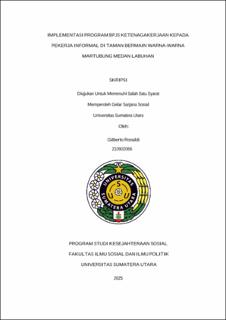| dc.description.abstract | Workers in carrying out their activities, both formal and informal workers,
must have obstacles and social risks that will have an impact on the safety, health,
continuity of life and welfare of them and their families, so they need social security.
One form of social security made by the government is BPJS Employment. The
Manpower Social Security Program (BPJS Ketenagakerjaan) is one of the policies
made as an initiative of the Indonesian government which aims to provide social
protection in the form of social security insurance for workers. This research aims
to describe the implementation of the BPJS Ketenagakerjaan program for informal
workers, especially street vendors at Taman Bermain Warna-Warna Martubung,
Medan Labuhan. The background of this research is based on the low participation
rate of informal workers in the employment social security program, even though
they have high work risks. This research uses a descriptive qualitative approach
with data collection techniques through observation, in-depth interviews, and
documentation. The implementation model used is the David C. Korten model,
which focuses on the compatibility between the program, implementers, and target
groups. The results show that although the BPJS Employment program has been
socialised in Medan Labuhan area, there are still many traders who do not
understand the benefits and procedures of this program. The main obstacles in
implementation include the lack of direct socialisation, the limited number of BPJS
officers, and the lack of public trust in the social security program. This study
recommends the need to improve communication strategies, community
approaches, and ease of access to registration for informal workers so that
program participation can increase and provide broader social protection. | en_US |


